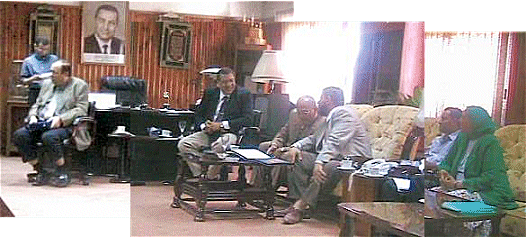Office of the
President of Al Azhar University
23-sep-03, morning
 Today we visit Al Azhar University.
It is
the oldest University in the world,
founded in 970 AD.
We are greeted by the President, Ahmed Omar Hashem, who cannot stay for
the discussion.
The Vice-President talks about the University in an impenetrable accent.
(Bashar later tells us that his Arabic is just as hard to understand; he
apparently has a severe speech impediment.)
Also with us are a number of faculty members and doctoral students who
are English-speakers with a particular interest in cross-cultural issues.
One of the men has read Sam's book, "Faces of the Enemy".
Today we visit Al Azhar University.
It is
the oldest University in the world,
founded in 970 AD.
We are greeted by the President, Ahmed Omar Hashem, who cannot stay for
the discussion.
The Vice-President talks about the University in an impenetrable accent.
(Bashar later tells us that his Arabic is just as hard to understand; he
apparently has a severe speech impediment.)
Also with us are a number of faculty members and doctoral students who
are English-speakers with a particular interest in cross-cultural issues.
One of the men has read Sam's book, "Faces of the Enemy".
They express interest in cultural dialogue rather than religious dialogue.
Much of the Koran is "decontextualized"
in the west.
Someone discusses "open versus closed texts" of Islam.
This is a new concept for us.
Hajj (the Mecca pilgrimage), for instance, is
closed -- it cannot be explained in rational terms.
Another example is the five pillars.
Open versus closed is itself a long study, we are told.
Someone else explains that closed books are of no interest
to non-Muslims. The fact that a Muslim can have four wives should be
of "no interest to outsiders."
[I sense that this is a facile way of evading some deep
cultural differences and of dealing with some internal ambivalence.
This is a very significant difference from the way Christian scholars
deal with difficult biblical texts.]
The Palestinian issue quickly comes up.
The western press is denounced for using the term "suicide bombers"
instead of "martyrs".
One woman says that she feels that the western press values the lives of
children more highly if they are Israeli.
When discussing the possibility of a truce, someone says that the last
truce was violated by Israel after only three days, when they assassinated
a Hamas leader.
Therefore, they argue, no truce is possible because Israel cannot be trusted.
There is much emphasis on the need for America to be perceived as
a fair broker in the peace process. They express much admiration of
Jimmy Carter, respect for Bill Clinton, and strong dislike
for George W. Bush.
The Prince Abdullah initiative (which acknowledges Israel's continued
existence) is widely accepted here.
I ask my leading question:
The Arab nations are so focused on the
Palestinian issue that they aren't addressing their own internal problems.
Some leaders even seem to be using the Palestinian issue to divert
attention from their own shortcomings.
What would be the prime problems, the "next steps", in the Arab world
if the Palestinian issue were "magically" resolved?
The answer surprises me: they tell us that they cannot answer, that
only their leaders could decide such issues.
We say our goodbyes and leave.
This was an interesting meeting except when the Vice-President spoke.
He was hard to understand and generally gave only empty platitudes.
Whenever he spoke, the oxygen seemed to be sucked right out of the room.
I sensed impatience on the Egyptian side, as well.
This meeting also showed some depressingly extreme opinions, especially
given that this is a group of academics focused on inter-cultural dialogue.
Another observation:
I've noticed a theme in our Egyptian meetings: the Egyptians that
we've met tend to respond to questions by asking other questions.
|